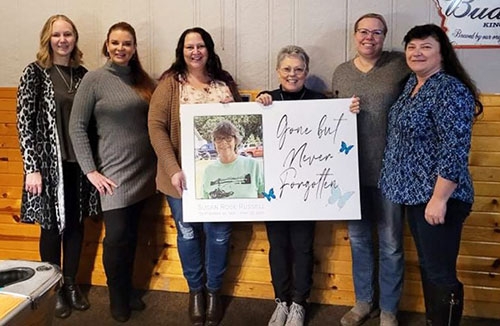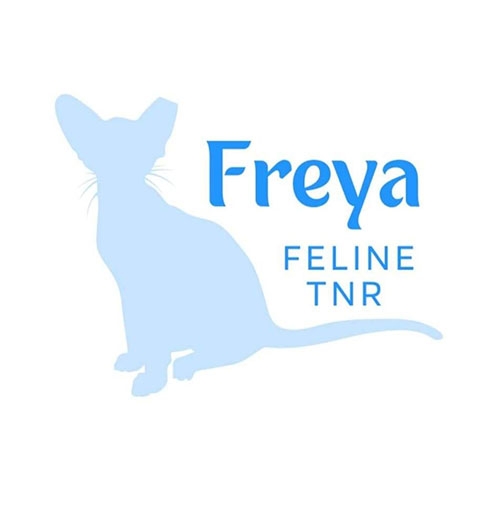You are here
Home ›Freya Feline TNR, Inc. of Lansing is committed to improving the quality of life of unclaimed cats, and to controlling their overpopulation

In her honor ... Last year, Freya Feline TNR, Inc. received a donation from the “Suzapalooza” benefit honoring Lansing resident Susan Russell, an animal lover and advocate, who died of cancer more than a year ago. “With that donation and other funds received, we altered and returned 32 cats in 60 days,” Freya Feline TNR, Inc. President Kristie Ringelstetter says. Pictured left to right in the above photo are Kristie Ringelstetter, Nicole Winke Gentes, Lyssa Eiden, Amy Stracener, Shane Scott and Angel Walleser (with a photograph of Susan Russell, in memoriam). Not pictured is new board member Jackie Kaukver. Submitted photo.

by Julie Berg-Raymond
When Kristie Ringelstetter, of Lansing, first spoke to the Lansing City Council in late September 2021 about forming an in-town trap-neuter-return (TNR) program for cats, she knew there would probably be some questions and concerns.
There was, for example, a concern about what would happen when a skunk got trapped, instead of a cat. “Who gets called, then?” someone wondered. Another person said that it was, after all, against city ordinances to “drop off” cats in town - “which is what you would be doing,” the person noted.
“Well, they’re already here,” Ringelstetter responded to that suggestion. “We’re trying to make sure they don’t reproduce.” On the question of the accidental skunk, she said she’d never had that problem; but she added that she would be talking with the Department of Natural Resources (DNR) and animal welfare organizations about the possibility.
She assured the council that she would not seek help from the City, if such a thing should happen. Additionally, she said, “I’m not seeking any funding. I just want the City to be aware of our efforts.”
Ringelstetter had been personally altering cats out of her own pocket for more than four years, at that point. “We’ve identified at least five neighborhoods where this is an issue,” she told the council. “Our program is a measure to prevent continued growth of a cat population that is out of control.”
Today, almost a year later, Ringelstetter and some of her friends - cat lovers and animal welfare advocates, all - head up an organization they formed in order to streamline their efforts - Freya Feline TNR, Inc. Named after Freya, a warrior goddess in Norse mythology who is associated with fertility and who rides a chariot pulled by two (usually blue) cats, the organization is going strong and recently was selected as a 2022 recipient of a $1,500 Miccio Foundation mini-grant.
“We are so grateful to have been selected for the grant funding and plan to use these funds to continue the work that we officially started in October 2021,” Ringelstetter says.
Freya Feline TNR’s stated mission is to improve the quality of life for the many unclaimed cats within the city limits of Lansing. “We are a volunteer-led, charitable organization committed to the education of our community about the benefits of healthy feral cat colonies and our efforts to control the over-population of neighborhoods with an ongoing TNR - trap, neuter, return - program,” Ringelstetter says.
Research supports the organization’s efforts: The National Feline Research Council reports that, “implemented with sufficient intensity (i.e., sterilizing enough cats in a given area), TNR has been shown to stabilize, reduce, and even eliminate free-roaming cat populations at a local level. Computer modeling suggests that population reductions are achievable if at least 30 percent of the unsterilized portion of a given population is sterilized every six months.”
HOW IT ALL STARTED
“I started feeding a stray cat about (six) years ago,” Ringelstetter recalls. “He must have told his friends because a few more showed up and brought kittens with them.” She says that, in those early years, she was able to socialize around 15 kittens and rehome them to friends and family.
“At first, I funded the vet bills out of my own pocket or with the help of the area humane society’s Feral Cat Vouchers,” she says. “As the cats kept multiplying, I opened a GoFundMe and received around $1000 from friends and family toward spaying and neutering the adult cats that were now regularly showing up for breakfast and dinner.”
Ringelstetter quickly realized that altering only a few cats at a time meant that the remaining unaltered cats would continue to reproduce - producing upwards of three litters per year, with an average of four to five kittens per litter.
Meanwhile, some of her friends and neighbors had also been doing their parts to trap, alter and re-home or release the cats in their own neighborhoods. “Sometimes they’d pay out of pocket, sometimes they’d get TNR vouchers, and sometimes a very generous Lansing resident would put funds on deposit for our use at a Waukon veterinary clinic,” she says. “So, there was already an effort to curb the reproduction; but it was a little scattered here and there, a little under-funded, and the cats just kept coming. It was getting to be overwhelming to be solo trappers.”
Nicole Winke Gentes - the attorney in the group - suggested they try to organize their efforts rather than just keep trying to get a handle on their own colonies. If they started a 501(c)(3), she said, they would be eligible for grant funding. They held their first meeting at the end of October 2021. Other founding members are Lyssa Eiden, Amy Stracener, Shane Scott and Angel Walleser.
“Freya is currently fielding several requests for assistance from property owners as awareness of our group grows,” Ringelstetter says. “Our focus is strictly on reducing the numbers of breeding felines within our city limits; we are not able to help rehome or provide adoption services. Anyone in need of those services should contact the area’s other humane societies and rescues.”
To follow Freya’s TNR efforts, like its Facebook page - Freya Feline TNR, Inc.; to donate, email freyatnr@gmail.com.
ABOUT THE MICCIO FOUNDATION
The Miccio Foundation was founded in 2000 by Ursula Delworth, a professor of counseling psychology at The University of Iowa. Dr. Delworth died in May 2000 before fully realizing her dream of a foundation for the benefit of Iowa’s animals, but a dedicated board of directors continues her vision.
Funds can be used for, but are not limited to, such projects as humane education, start-up programs, medical care and equipment, spay/neuter programs, caging and adoption support. These projects should have an immediate, direct and measurable effect on improving animal welfare in the target community.
The Miccio Foundation has awarded over $982,000 since 2001. Additional information about Miccio can be found at its website: www.miccio.org.

